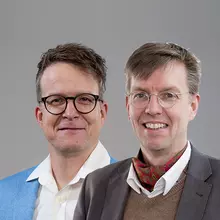Experts with a vision

The decarbonisation of society and the transition to an All Electric Society (AES) are key challenges for industry. In our interview with the DKE (German Commission for Electrical, Electronic & Information Technologies), Thomas Sentko and Johannes Stein shed a light on how standardisation, digitalisation and sector coupling interact to make the energy transition possible in terms of technologies and organisation.

Johannes Stein
Position: Senior Principal Expert Horizontal Topic Development All Electric Society
- Company: DKE Deutsche Kommission Elektrotechnik Elektronik Informationstechnik

Thomas Sentko
Position: Normungsmanager Components & Technologies Breitband-, Glasfaser- & Steckverbinder-Technologie
- Company: DKE Deutsche Kommission Elektrotechnik Elektronik Informationstechnik
AES as a driver
tec.news: To what extent do you regard the AES as a driver of transformation?
Johannes Stein: The motivation behind the All Electric Society is plain and simple: In order to decarbonise society, renewable energies must be expanded and electrification driven forward. Applications such as electric cars and heat pumps are examples of these developments. The challenge lies in managing the volatility of renewable energies and ensuring supply security. Digitalisation, data utilisation and automation are the keys to creating new, resilient energy systems.
Norms and standards
tec.news: Why are norms and standards so important for digital networking and the operation of critical infrastructures, and what role does DKE play in this?
Thomas Sentko: A functioning communications infrastructure represents the backbone of the digital society. The DKE makes a significant contribution to establishing standards for the planning, operation and documentation of networks. Digital planning and standardised processes are what make it possible to build, operate and manage infrastructures efficiently - whether for energy, water, gas or telecommunications. Standardisation forms the basis for these processes.
Role of the DKE
tec.news: How does the DKE contribute to cross-sector networking and harmonisation in the All Electric Society?
J.S.: Sector coupling is a central, pivotal goal of the AES – in other words the networking of electricity, heat, mobility and industry. DKE is promoting these objectives through studies, specialist conferences and pilot projects, for example with the University of Magdeburg. The new "All Electric Society Platform for Cross-Sector Data Economy" committee is now intended to bring loose threads together, harmonise approaches and Europeanise and internationalise solutions. The Digital Product Passport (DPP 4.0), based on the Asset Administration Shell (AAS), is an important building block for rendering data usable across sectors and in a standardised manner.
Communications infrastructure
tec.news: How does DKE design the standardisation of the communication infrastructure within the framework of the AES and what role does Ethernet play in this?
T.S.: DKE supports the convergence to Ethernet as a universal communication platform. Standards for the passive infrastructure and the physical layer are being developed together with international committees such as the IEC. The asset administration shell ensures that components - from connectors to cables - can be described digitally and used interoperably.
DKE in cooperation with industry
tec.news: How does DKE perceive itself interacting with industry and other players in the development of standards for the AES?
J.S.: DKE perceives itself as a platform and moderator for industry. The organisation brings different specialist groups together, promotes consensus and internationalises solutions. Standards are recommendations, not legislation - their acceptance and dissemination depend on the commitment of industry. The DKE provides the framework for jointly developing standards that will enable the AES.
Standardisation as the basis for AES
tec.news: Why are norms and standardisation by DKE so important for the success of the All Electric Society?
T.S.: The All Electric Society is the umbrella organisation for numerous technical solutions and innovations. With its standardisation work, the DKE is creating the conditions for sustainability and cost-efficiency to go hand in hand. The digitalisation of products, the harmonisation of interfaces and the development of cross-sector standards form the essential foundation for a successful energy transition.
Get involved in shaping the tec.news!
Your feedback helps us to tailor the magazine even better to your interests and needs.



